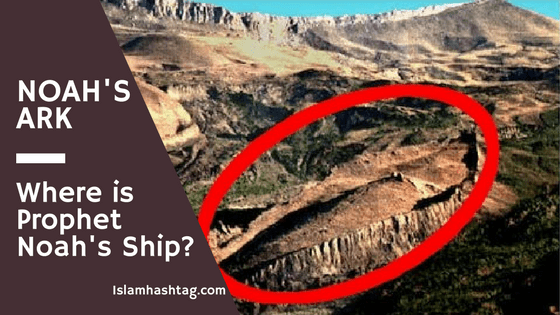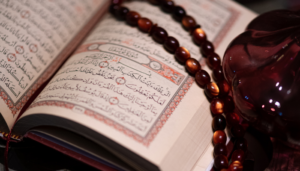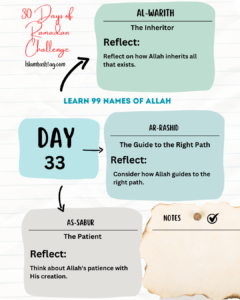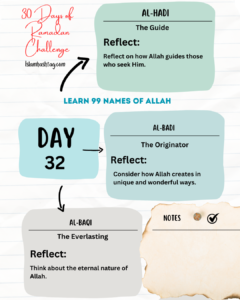Why are We Concerned Noah’s Ark ?
Allah says in Quran that He has left Noah’s Ark as a sign for People who take admonition . It is clear in the following Verses of Quran.
Ramadan Offer
[Quran :chapter 54 : 9-17] Before them the people of Noah also denied.They called Our servant a liar, and said, “He is a madman,” and he was rebuked harshly.At last, he called out to his Lord, saying,” I am overcome: take now Thy vengeance.” Then We opened the gates of heaven with torrential rain and We caused the earth to burst forth into springs, and the waters met to fulfill the decreed end.
And We bore Noah upon a thing made of planks and nails,which floated under Our care. This was a vengeance for the sake of him who had been slighted. And We left that Ark as a Sign. Then, is there any who would take admonition? Just see how dreadful was My scourge and how true My warnings! We have made this Qur’an an easy means of admonition. Then, is there any who would take admonition?
Read What Quran Says about Jesus (Prophet Isa AS )
References to Noah AS in the Quran/Noah’s Ark from Quran
Noah AS has been mentioned in many Places in Quran .They are –
- Noaah AS as one of the first messengers: 4:163, 6:84, 11:25, 26:107, 29:14, 37:75, 57:26, 71:1–2, 71:5
- Noah AS’s preaching: 4:163, 7:59, 7:61–64, 10:71–72, 11:25–26, 11:28–31, 11:42, 23:23, 26:105–106, 26:108, 26:110, 71:1–3, 71:8–20
- Challenges for Noah AS: 7:60–61, 10:71, 11:27, 11:32, 14:9, 23:24–26, 25:37, 26:105, 26:111–113, 26:116–118, 38:12, 40:5, 50:12, 53:52, 54:9–10, 66:10, 71:6–7, 71:21–24, 71:26–27
- “The Thankful” Noah: 17:3
- Noah AS’s wishes granted: 21:76–77, 26:119, 37:75, 54:11–12
- God destroyed Noah AS’s people: 7:64, 9:70, 10:73, 11:37, 11:43–44, 11:89, 23:27, 25:37, 26:120, 29:14, 37:82, 40:31, 51:46, 53:52, 54:11–12, 71:25
- Noah AS was saved on the Ark: 7:64, 10:73, 11:37–38, 11:40–44, 11:48, 23:27–29, 26:119, 29:15, 37:76, 54:13–15, 69:11
- Appraisal for Noah: 17:3, 37:78–81, 66:10
The Reason of Punishment of People of Prophet Noah AS
For many generations Noah’s people had been worshipping statues that they called gods. They believed that these gods would bring them good, protect them from evil and provide all their needs. They gave their idols names such as Waddan, Suwa’an, Yaghutha, Ya’auga, and Nasran, (These idols represented, respectively, manly power; mutability, beauty; brute strength, swiftness, sharp sight, insight) according to the power they thought these gods possessed.
Allah the Almighty revealed: “They (idolaters) have said: “You shall not leave your gods nor shall you leave Wadd, nor Suwa, nor Yaghuth, nor Ya uq nor Nasr (names of the idols).” [Ch 71:23 Quran].
Originally these were the names of good people who had lived among them. After their deaths, statues of them were erected to keep their memories alive. After sometime, however, people began to worship these statues. Later generations did not even know why they had been erected; they only knew their parents had prayed to them. That is how idol worshipping developed. Since they had no understanding of Allah the Almighty Who would punish them for their evil deeds, they became cruel and immoral.
Ibn Abbas explained: “Following upon the death of those righteous men, Satan inspired their people to erect statues in the places where they used to sit. They did this, but these statues were not worshiped until the coming generations deviated from the right way of life. Then they worshipped them as their idols.”
In his version, Ibn Jarir narrated: “There were righteous people who lived in the period between Adam and Noah and who had followers who held them as models. After their death, their friends who used to emulate them said: ‘If we make statues of them, it will be more pleasing to us in our worship and will remind us of them.’ So they built statues of them, and , after they had died and others came after them, Iblis crept into their minds saying:’Your forefathers used to worship them, and through that worship they got rain.’ So they worshipped them.”
Allah the Almighty told us: “Indeed We sent Noah to his people (he said): ‘I have come to you as a plain Warner that you worship none but Allah, surely, I fear for you the torment of a painful Day.’ The chiefs of the disbeliveers among his people said: ‘We see you but a man like ourselves, nor do we see any follow you but the meanest among us and they too followed you without thinking. And we do not see in you any merit above us in fact we think you are liars.’” [Ch 11:25-27]
Thus the conflict between Noah and the heads of his people intensified. The disbeliveers tried to bargain: “Listen Noah, if you want us to believe in you, then dismiss your believers. They are meek and poor, while are elite and rich; no faith c an include us both.” Noah listened to the heathens of his community and realized they were being obstinate. However, he was gentle in his response. He explained to his people that he could not dismiss the believers as they were not his guests but Allah’s.
Noah appealed to them: “O my people! I ask of you no wealth for it, my reward is from none but Allah. I am not going to drive away those who have believed. Surely, they are going to meet their Lord, but I see that you are a people that are ignorant. O my people! Who will help me against Allah, if I drove them away?
Will you not then give a thought? And I do not say to you that with me are the Treasures of Allah nor that I know the unseen, nor do I say I am an angel, and I do not say of those whom your eyes look down upon that Allah will not bestow any good on them. Allah knows what is in their inner selves (regards to Belief). In that case, I should, indeed be one of the Zalimeen (wrongdoers, oppressors etc).” [Ch 11:29-31 Quran]
Noah refuted the arguments of the disbeliveers with the noble knowledge of the prophets. It is the logic of intellect that rids itself of personal pride and interests.
The rulers were tired of Noah’s arguments. Allah the Exalted related their attitude: They said: “O Noah! You have disputed with us and much have you prolonged the dispute with us, now bring upon us what you threaten us with, if you are of the truthful.” He said: “Only Allah will bring it (the punishment)on you, if He will, and then you will escape not. And my advice will not profit you, even if I wish to give you counsel, if Allah’s Will is to keep you astray. He is your Lord! And to Him you shall return.“ [Ch 11:32-34 Quran]
The battle continued; the arguments between the disbeliveers and Noah became prolonged. When all the refutations of the disbeliveers collapsed and they had no more to say, they began to be rude and insulted Allah’s prophet: ‘The leaders of his people said: “Verily, we see you in plain error.” [Ch 7:60 Quran]
Noah responded in the manner of the prophets: “O my people! There is no error in me, but I am a Messenger from the Lord of the Alamin (mankind, jinn and all that exists)! I convey unto you the Messages of my Lord and give sincere advice to you. And I know from Allah what you know not.” [Ch 7:61-62 Quran]
Noah AS continued to call his people to believe in Allah for nine hundred fifty years. Allah the Almighty said: Indeed We sent Noah to his people and he stayed among them a thousand years less fifty years (inviting them to believe in the Oneness of Allah (Monotheism) and discard the false gods and other deities). [Ch 29:14 Quran]
It happened that every passing generation admonished the succeeding one not to believe Noah and to wage war against him. the father used to teach his child about the matter that was between himself and Noah and counsel him to reject his call when he reached adulthood. Their natural disposition rejected believing and following the truth.
Noah’s Ark
It was constructed on Allah’s Command
Allah the Exalted ordered His worshipper Noah to build an ark with His knowledge and instructions and with the help of angels. Almighty Allah commanded: “And construct the ship under Our Eyes and with Our Inspiration and address Me not on behalf of those who did wrong; they are surely to be drowned.” [Ch 11:37 Quran]
Noah’s Ark was built outside the City
Noah chose a place outside the city, far from the sea. He collected wood and tools and began to day and night to build the ark. The people’s mockery continued: “O Noah! Does carpentry appeal to you more than prophethood? Why are you building an ark so far from the sea? Are you going to drag it to the water or is the wind going to carry it for you?”Noah replied: “You will come to know who will be put to shame and suffer.”
Who were on the Noah’s Ark ?
Almighty Allah narrated: So it was till then there came Our Command and the oven gushed forth (water like fountains from the earth). We said: “Embark therein, of each kind two (male and female), and your family, except him against whom the Word has already gone forth, and those who believe.” And none believed him except a few. [Ch 11:40 Quran]
Structure of Noah’s Ark
In contrast to the Jewish tradition, which uses a term that can be translated as a “box” or “chest” to describe the Ark, surah 29:15 of the Quran refers to it as a safina, an ordinary ship, and surah 54:13 describes the ark as “a thing of boards and nails”. Abd Allah ibn Abbas, a contemporary of Muhammad, wrote that Noah was in doubt as to what shape to make the ark, and that Allah revealed to him that it was to be shaped like a bird’s belly and fashioned of teak wood.
Mention of Noah’s Ark in other scriptures
According to the Qur’an, Prophet Noah was sent to his people, who were the first to corrupt the Right Way of life followed by Adam (Allah’s peace be upon him) and taught by him to his descendants. We learn from the brief hints in the Qur’an and the details in the Bible that the people of Noah lived in the country which is now called Iraq.
The same is confirmed by the tablets found in the archaeological remains of Babel which are older than the Bible. They tell a story similar to the one related in the Bible and the Qur’an, and fix the place of its occurrence near Mosul. Moreover, the traditions that have come down from the most ancient times from Kurdistan and Armenia say that the ark of Noah anchored at some place in the same region. They also point out to some relics connected with the story of Noah near Mt. Ararat and the inhabitants of Nakhchiwan claim even today that the town was founded by Prophet Noah.
Traditions, similar to the story of Noah, are found in the ancient literatures of Greece, Egypt, India and China. Besides these, the traditions that have come down from the roost ancient times from Burma, Malaya, East Indies, Australia, New Guinea and from different parts of Europe and America are also similar to it. All this shows that this story is connected with the period when all the descendants of Adam lived in the same region from where they dispersed all over the earth.
Location of Noah’s Ark
Thee Noah’s Ark (Hazrzt Noah’s Ship ) was left as a sign of warning by Allah swt . Its resting and existence on a high mountain continued to warn the later generations of the wrath of God for thousand of years and kept on reminding them how the people who had disobeyed God on this earth had met their down, and how the believers had been rescued from it.
Imam Bukhari, Ibn Abi Hatim, ‘Abdur Razzaq and Ibn Jarir have related traditions on the authority of Qatadah saying that at the time the Muslims conquered ‘Iraq and al-Jazirah, this Ark still existed on Mount Judi (and according to a tradition, near the settlement of Baqirda), and the early Muslims had seen it. In the modern times also some people during their flights in the airplanes have sighted an Ark-like object on a peak in this region, which is suspected to be the Ark of Noah, and on the basis of the same expeditions have been sent from time to time to search it out.
According to the Qur’an, the Ark rested upon Mount Judi, which is situated to the North-east of Jazirah Ibn ‘Umar in Kurdistan. But according to the Bible its resting place was Mount Ararat in Armenia, which is one of the ranges of mountains of tire same name that extends from Armenia to southern Kurdistan. Mount Judi is one of the mountains of the Ararat range, and is known by the same name even today.
The ancient histories confirm that the resting place of the Ark was Mount Judi. For instance, Berasus, a religious leader of Babylonia, who lived about 250 years before Christ, says in his history of the Chaldeans that Noah’s Ark rested upon Mount Judi. Abydenus, a pupil of Aristotle, not only confirms the same but also says that many people of `Iraq of his time possessed pieces of the Ark, which they ground in water and gave to the sick as a medicine.
Did Noah’s Flood cover the whole earth?
Now let us consider the question: Did the Flood mentioned here cover the whole earth or was it confined to that particular region where Prophet Noah lived? This is a question which has not been finally settled up to this day. As far as the Bible and the Israelite traditions are concerned, this was universal. (Genesis 7: 18-24). But the Qur’an is silent about it, though it does say things which show that the whole human race after the Deluge was the descendant of Prophet Noah and of those with him in the Ark, but this does not mean that the Deluge covered all the earth.
It may be explained like this: at that time of the history the only region of the earth, which was inhabited by the human race, was the region in which Noah lived, and the generations which came after the Deluge, gradually spread over other parts of the earth. This theory is supported by two things. First, there is a conclusive proof that a great flood did come over the land of the Tigris and the Euphrates.
This is confirmed by historical traditions, archaeological remains and geological evidence. But there are no such proofs in the other parts of the earth as might show that the Deluge was universal. Secondly, traditions have come down to almost all the peoples of the earth living even in distant places like America and Australia, that once a great flood had come all over the earth.
The only conclusion which can be drawn from the above is that at one time the forefathers of all the people of the earth lived at one place. But, when afterwards they spread over different lands in the earth; they carried the traditions of the Deluge along with them. (Please refer to tafseer of verse 47 of Al-A’araf).
Ref :
- Tafseer -Tafheemul Quran
- Wikipedia
- Quran
Discover more from Islam Hashtag
Subscribe to get the latest posts sent to your email.





